“The
meadows clothe themselves with flocks, the valleys deck themselves
with grain, they shout and sing together for joy. My heart overflows
with a pleasing theme; I address my verses to the king. I will sing
praise with my spirit.”
(Psalm
65:13, Psalm 45:1, 1Corinthians 14:15)
A Pleasing Theme
Dear Friend,
Greetings! As I am sure we are all aware, music, especially today, transcends cultures, nationalities, social status, generations, etc. It permeates our entire existence.
Our first articles today, all have to do with music and its place in our world.
The importance of music cannot be overstated. Lucifer, the enemy of both God and man, was even created with musical instruments embedded in his body.
“Thou hast been in Eden the garden of God; every precious stone was thy covering, the sardius, topaz, and the diamond, the beryl, the onyx, and the jasper, the sapphire, the emerald, and the carbuncle, and gold: the workmanship of thy tabrets and of thy pipes was prepared in thee in the day that thou wast created.” (Ezekiel 28:13)
“Thy pomp is brought down to the grave, and the noise of thy viols: the worm is spread under thee, and the worms cover thee.” (Isaiah 14:11)
Angela Monet put it so well in her short poem:
“Music speaks what cannot be expressed,
soothes the mind and gives it rest,
heals the heart and makes it whole,
flows from heaven to the soul.”
Have a great week ahead and we pray we can all try to stay in tune with Jesus.
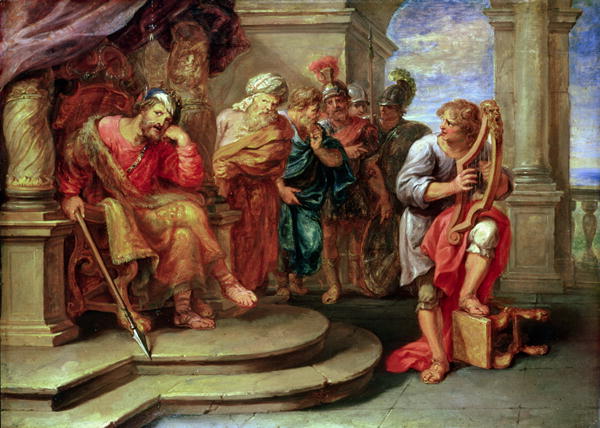
1 Samual 16
"The Spirit of the LORD departed from Saul, and an evil spirit from the LORD troubled him. And Saul's servants said unto him, Behold now, an evil spirit from God troubleth thee. Let our lord now command thy servants, which are before thee, to seek out a man, who is a cunning player on a harp: and it shall come to pass, when the evil spirit from God is upon thee, that he shall play with his hand, and thou shalt be well.
And Saul said unto his servants, Provide me now a man that can play well, and bring him to me. Then answered one of the servants, and said, Behold, I have seen a son of Jesse the Beth'lehemite, that is cunning in playing, and a mighty valiant man, and a man of war, and prudent in matters, and a comely person, and the LORD is with him.
And it came to pass, when the evil spirit from God was upon Saul, that David took a harp, and played with his hand: so Saul was refreshed, and was well, and the evil spirit departed from him."
2 Kings 3
"Now bring me (Elisha) a minstrel. And it came to pass, when the minstrel played, that the hand of the LORD came upon him. And he said, Thus saith the LORD, Make this valley full of ditches.
For thus saith the LORD, Ye shall not see wind, neither shall ye see rain; yet that valley shall be filled with water, that ye may drink, both ye, and your cattle, and your beasts."
***
Waking Times (Edited from longer article. Ed.)
Pythagoras - Mad Shaman or Mathematician?
October 10, 2012
Christina Sarich, Contributing Writer -
"Not only is the Universe stranger than we think, it is stranger than we can think." -Werner Heisenberg, Across the Frontiers

Buckminster Fuller has described himself as a modern Pythagorean. His geodesic dome has been recreated over 300,000 times according to www.bfi.org. Other visionaries have identified with Pythagoras too, such as Plato, Leonardo Da Vinci, Leary, and a slew of biologists, chemists, musicians, and futurists. While ancient societies used sound to heal, including the Babylonians, Israelites, Hindus, Persians, Egyptians, Sumerians, Chinese Taoists and Aboriginals, just to name a few, Pythagoras, the Grecian mathematician and musician obsessed with the lyre, was curious enough about music to propose an entire cosmology on the repetitive patterns of sound he found one day when walking by a blacksmith's shop.
Listening to the blacksmith's iron be forged on the anvil, he noticed that it had a certain musical quality, and upon further inspection, that dependant upon where the anvil hit the iron, there was a consistent note which played as it was made malleable. He later went home and experimented with making the one-string instrument, which became the workshop for his octave discovery and the ensuing cosmology he tried to create from his initial impression at the blacksmith.
"Do you know that our soul is composed of harmony." Leonardo da Vinci, Notebooks (1451-1519)
"The highest goal of music is to connect one's soul to their Divine Nature, not entertainment." Pythagoras (569- 475 BC)
This premise for his entire philosophy and cosmologic portrayal was gleaned not just from the humble observance of a man at work, but also from his study of ancient teachings, which he then recast to Greece, in 'modern' terms. He was also the first Westerner to declare that the earth was round instead of flat. Make no mistake, the mathematician was spiritually in-spired. He built an ashram in Kroton, Italy and traveled extensively throughout Asia Minor, Egypt and India. He was inducted into Egyptian mystery schools. He developed a spiritual brotherhood that was vegetarian and devoted to social equality and yogic teachings he learned throughout his travels. He influenced even the likes of Plato with his spiritual take on mathematics and music theory. He was a history-changing figure who defies categorization.
"If you listen to Werner Heisenberg lecturing about Pythagoreanism in his own work on the quantum theory, you will hear him emphasize that the basic building blocks of nature are number and pattern, that the universe is not made out of matter, but music. The historians of science I worked with in the University regarded Pythagoras as a magician, a shamanic madman from the cults of the Near East; yet both Whitehead and Heisenberg regarded him as a genius of highest order who laid the foundation upon which our entire Western civilization is based" - William Irwin Thompson, Darkness and Scattered Light (London: Anchor Press Books, 1978. p. 110.)
Music as a Mathematical Formula
Pythagoras deduced that sound was based on a purely mathematical formula and later insisted that music could heal the non-virtuous thoughts of man, like anger and jealousy. He performed what were called 'soul-adjustments.' While many are familiar with the Pythagorean theorems taught in high school math classes, most are never introduced to the visionary's larger ideas. This Grecian intellectual had more to offer than just equations to memorize for annual exams.
The Pythagorean (or Pythagoras') Theorem is the statement that the sum of (the areas of) the two small squares equals (the area of) the big one.
In algebraic terms, a² + b² = c² where c is the hypotenuse while a and b are the legs of the triangle.
Pythagoras once told his students that you could soothe many human emotions with 'musical medicine.' He would often sit and play the kithara, a stringed instrument akin to a guitar or lyre, singing along with it. It is said that he could soothe both human and beast with his voice and playing. Pythagoras is also credited with discovering the seven modes of music and once dissuaded a drunken man from burning down his unrequited love's house by urging a flutist playing nearby to change his tune to one of a more slow and even temperament. Aside from the emotional changes that sound can inspire, it seems that Pythagoras also used music to heal physical ailments.
When I am working on a problem, I never think about beauty but when I have finished, if the solution is not beautiful, I know it is wrong. - R. Buckminster Fuller
Pythagoras is credited with curing sciatica, but also deformities of the body, citing that, beauty is nothing but a harmonious combination of elements. He believed that by making harmonious sounds, one could heal any disease or deformity. Even as many 'modern' societies were using music as a part of their spiritual or religious practices, Pythagoras unequivocally gave music therapy a mathematic and scientific basis upon which to be examined:
The therapeutic music of Pythagoras is described by Iamblichus (ca. 245-330) Preeminent Neoplatonist of his age) thus: "And there are certain melodies devised as remedies against the passions of the soul, and also against despondency and lamentation, which Pythagoras invented as things that afford the greatest assistance in these maladies. And again, he employed other melodies against rage and anger, and against every aberration of the soul. There is also another kind of modulation invented as a remedy against desires."
It was by dissecting music as a mathematical subtext, that he was able to deduce what ancients knew intuitively, or what was passed down as sacred knowledge in their tribes and villages. The aboriginals, for example, even used the Digeridoo to heal broken bones, and when the sound of this instrument is examined from a theoretical perspective, you can see that it is the same harmonic ratios which Pythagoras demonstrated - one that he tied to all phenomena in nature, including the planets, constellations, and elements of the periodic table - which are responsible for the healing.
***
universetoday
Music of the Spheres
by NICHOLOS WETHINGTON
JANUARY 20, 2010

Pythagoras, the Greek mathematician and philosopher, is credited with saying, "There is geometry in the humming of the strings. There is music in the spacing of the spheres." This idea of the "Music of the Spheres" has endured over the centuries, ultimately informing how Kepler visualized the movements of the planets, which led him to formulate his laws of planetary motion. The notion that the stars, planets and galaxies resonate with a mystical symphony is a rather appealing one.
***
Smithsonian.com
What Is the Most Annoying Sound in the World? (Edited from longer article. Ed.)
A new study examines which sounds are most unpleasant to the human ear.
Joseph Stromberg
October 16, 2012

Image via Flickr/Stephen Dann
It's so universal that it's become a cliché: nails on a chalkboard. When it comes to noises that bother everyone's ears, it's seemingly a given that scraping fingernails across a slate board is the one that everyone hates most.
But when a group of neuroscientists decided to test which sounds most upset the human brain, they discovered that fingernails on a chalkboard isn't number one. It's not even number two. As part of their research, published last week in the Journal of Neuroscience, they put 16 participants in an MRI machine, played them a range of 74 different sounds and asked them to rate which were most annoying.
1. A knife on a bottle -
2. A fork on a glass -
3. Chalk on a blackboard -
4. A ruler on a bottle -
5. Nails on a blackboard -
6. A female scream -
7. An anglegrinder (a power tool)
8. Squealing brakes on a bicycle -
9.A baby crying -
10. An electric drill
They also played the participants a number of more pleasant noises. Here were the four they rated as the least irritating:
1. Applause -
2. A baby laughing -
3. Thunder -
4. Water flowing
Even more interesting than the rankings were the parts of the brain that lit up with activity when the research participants heard the irritating noises. The MRI scans revealed that along with the auditory cortex (which processes sounds), activity in the amygdala--the region of the brain responsible for producing emotions--increased in direct proportion to the perceived unpleasantness of the sound. The researchers found that the amygdala interacted with signals coming from the auditory cortex, increasing the amount of unpleasantness conveyed by sounds at the top of the list, which all happen to occur in the frequency range between 2,000 and 5,000 Hz.

Brain activity in the amygdala increased for unpleasant sounds. Image via the Journal of Neuroscience
Why would the amygdala activate specifically for sounds within this range? "It appears there is something very primitive kicking in," says Sukhbinder Kumar, the paper's lead author, from Newcastle University in England. "Although there's still much debate as to why our ears are most sensitive in this range, it does include sounds of screams which we find intrinsically unpleasant."
***
***
NATIONAL REVIEW ONLINE
The Last Radicals
October 16, 2012
There is exactly one authentically
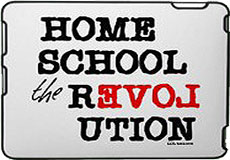 radical social movement of any real significance in the United
States, and it is not Occupy, the Tea Party, or the Ron Paul faction.
It is homeschoolers, who, by the simple act of instructing their
children at home, pose an intellectual, moral, and political
challenge to the government-monopoly schools, which are one of our
most fundamental institutions and one of our most dysfunctional. Like
all radical movements, homeschoolers drive the establishment bats.
radical social movement of any real significance in the United
States, and it is not Occupy, the Tea Party, or the Ron Paul faction.
It is homeschoolers, who, by the simple act of instructing their
children at home, pose an intellectual, moral, and political
challenge to the government-monopoly schools, which are one of our
most fundamental institutions and one of our most dysfunctional. Like
all radical movements, homeschoolers drive the establishment bats.
In the public imagination, homeschooling has a distinctly conservative and Evangelical odor about it, but it was not always so. The modern homeschooling movement really has its roots in 1960s countercultural tendencies; along with A Love Supreme, it may represent the only worthwhile cultural product of that era. The movement’s urtext is Summerhill: A Radical Approach to Child Rearing, by A. S. Neill, which sold millions of copies in the 1960s and 1970s. Neill was the headmaster of an English school organized (to the extent that it was organized) around neo-Freudian psychotherapeutic notions and Marxian ideas about the nature of power relationships in society. He looked forward to the day when conventional religion would wither away — “Most of our religious practices are a sham,” he declared — and in general had about as little in common with what most people regard as the typical homeschooler as it is possible to have.
“People forget that some of the first homeschoolers were hippies,” says Bob Wiesner, a counselor at the Seton Home Study School, a Catholic educational apostolate reporting to the bishop of Arlington, Va. In one of history’s little ironies, today most of homeschooling’s bitterest enemies are to be found on the left. “We don’t have much of a problem from conservatives,” Wiesner says. “It’s the teachers’ unions, educational bureaucrats, and liberal professors. College professors by and large don’t want students who can think for themselves. They want students they can indoctrinate, but that’s hard to do with homeschoolers — homeschoolers push back.” He relishes the story of a number of graduates of his program who attended a top-tier Catholic university and enrolled together in theology classes taught by the school’s most notorious liberals. They were of course more conversant with church orthodoxy than were many of their instructors. “The professors hated them. But the kids had fun. The president of that college at that time was trying to clean up the theology department, so when the professors would complain, he would call the students in and tell them to try to be polite — with a wink and a nod.”
One of those liberal professors is Robin West of the Georgetown law school, who wrote a remarkably shallow and evidence-free jeremiad against homeschooling that was published to the journal’s discredit in Philosophy and Public Policy Quarterly. More a work of imagination than one of scholarship, the article ignores the wealth of data suggesting that homeschooling is a largely upper-income and suburban phenomenon, and that homeschooled students typically outperform their public-school peers. West offers a caricature of homeschooling families far removed from reality: “The husbands and wives in these families feel themselves to be under a religious compulsion to have large families, a homebound and submissive wife and mother who is responsible for the schooling of the children, and only one breadwinner. These families are not living in romantic, rural, self-sufficient farmhouses; they are in trailer parks, 1,000-square-foot homes, houses owned by relatives, and some, on tarps in fields or parking lots. Their lack of job skills, passed from one generation to the next, depresses the community’s overall economic health and their state’s tax base.” Education scholar Brian D. Ray, who specializes in homeschooling, found that West’s claims “basically have no foundation in research evidence,” and pointed out to the contrary that “repeated studies by many researchers and data provided by United States state departments of education show that home-educated students consistently score, on average, well above the public school average on standardized academic achievement tests. To date, no research has found homeschool students to be doing worse, on average, than their counterparts in state-run schools. Multiple studies by various researchers have found the home educated to be doing well in terms of their social, emotional, and psychological development.”
The problem is not educational outcomes: Students in the Seton program tend to score on average in the 80th percentile on standardized tests. The problem is that progressives operate as though the state owned children as joint property. Dana Goldstein, writing in Slate, urged her fellow progressives to resist the temptation to homeschool, arguing that the practice is “fundamentally illiberal” and asking incredulously: “Could such a go-it-alone ideology ever be truly progressive?” She went on to argue that the children of high-achieving parents amount to public goods because of peer effects — poor students do better when mixed with better-off peers — meaning that “when college-educated parents pull their kids out of public schools, whether for private school or homeschooling, they make it harder for less-advantaged children to thrive.” She does not extend that analysis to its logical conclusion: that conscientious, educated liberals should enroll their children in the very worst public schools they can find in order to maximize the public good.
The numbers are against them, but West, Goldstein, and like-minded critics still bristle with hostility at homeschooling. There are three related reasons for that.
The first is that progressives by their nature do not trust people as individuals and feel that, whether we are applying for a credit card or popping into 7-Eleven for a soft drink, Americans require state-appointed overseers. If homeschooling weren’t already legal — a happy consequence of the longstanding patchwork of exemptions in state-level mandatory-education statutes — it is highly unlikely that most state legislatures would vote to legalize it. Nine-tenths of American children attend government schools, and most of the remaining tenth attend government-approved private schools. The political class wants as many of that remaining tenth in government schools as possible; teachers’ unions have money on the line, and ideologues do not want any young skull beyond their curricular reach. A political class that does not trust people with a Big Gulp is not going to trust them with the minds of children. While West would like to criminalize homeschooling — she writes wistfully of the days when “parents who did so were criminals” — others have sought to regulate it out of existence, for instance by declaring homeschoolers’ residences to be public schools and requiring them to meet attendant planning and zoning standards, by installing such things as fire-safety systems, parking facilities, and emergency exits. “The good news is, there are very few people with authority and power who want to end homeschooling,” says Jeremiah Lorrig of the National Home School Legal Defense Association. “They’ve given up trying to outlaw it — and now are trying to control it.”
The second reason for this hostility is that while there is a growing number of secular, progressive, organic-quinoa-consuming homeschool families, there remains a significant conservative and Christian component. The reasons for progressive hostility to conservative Christians are many and complex, but one of them is that, like the homeschool, the church is something outside of government control, a forum that the triple constitutional protections of religion, free speech, and association place beyond the range of Leviathan’s leash. Progressives are by their nature monopolists, and the churches constitute real competing centers of power in society.
A third reason is that the majority of homeschool teachers are mothers. A traditional two-parent family with one full-time breadwinner and one stay-at-home parent is practically built into the model. Goldstein scoffs at that as the “dated presumption that children hail from two-parent families, in which at least one parent can afford (and wants) to take significant time away from paid work,” but of course the model is neither dated nor restricted to religiously conservative red-staters: Liberal enclaves such as Brooklyn and Seattle are full of stay-at-home moms. (Brooklyn, in fact, is a hotbed of crunchy homeschooling.)
Americans are dissatisfied with many things: Congress, insurance companies, Wall Street, the media. Many are dissatisfied with the government schools, too, and homeschooling has given them an opportunity to do something about that, taking matters into their own hands. They could do the same thing with health insurance and banking, as well, were the legal environment liberal enough. As its critics best appreciate, homeschooling is about more than schooling.
The Tea Party and the Ron Paul movement are in some ways the conservative flipside of Occupy, albeit with better manners, more coherent ideas, and higher standards of personal hygiene. They comprise conservatives on the verge of despair at trying to achieve real social change through the process of electoral politics and the familiar machinery of party and poll, with its narrow scope of action, uncertain prospects, and impermanent victories. There is a different model for reform being practiced in more than 1 million American households, by people of wildly different political and religious orientations. Homeschooling represents a kind of libertarian impulse, but of a different sort: It is not about money. Homeschooling families pay their taxes to support local public schools, like any other family — which is to say, begrudgingly in many cases — and the movement does not seek the abolition of local government-education monopolies. (It should.) Homeschooling families simply choose not to participate in the system — or, if they do, to participate in it on their own terms.
And that is a step too far for the Hobbesian progressives, who view politics as a constant contest between the State and the State of Nature, as though the entire world were on a sliding scale between Sweden and Somalia. Homeschoolers may have many different and incompatible political beliefs, but they all implicitly share an opinion about the bureaucrats: They don’t need them — not always, not as much as the bureaucrats think. That’s what makes them radical and, to those with a certain view of the world, terrifying.
CS Monitor
Europe's independence seekers: Scotland, Catalonia, and now ... Venice
By Nick Squires
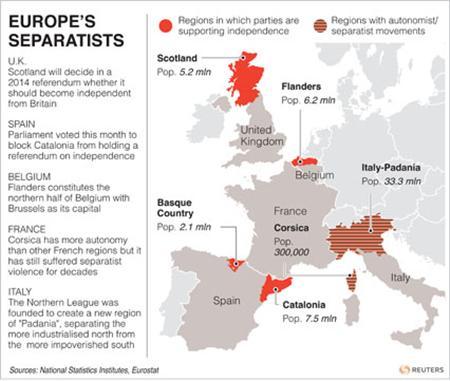
October 13, 2012 - Rome--It was once one of Europe's richest trading powers, with its ships and merchants found across the Mediterranean. Venice's glory days have long since passed, but it is now rekindling its heritage and weighing a return to independence from Italy.
It may seem fanciful, but a burgeoning independence movement is confidently predicting that it will achieve nationhood before two of Europe's other restive regions, Scotland and Catalonia.
It certainly has the historical pedigree--Venice was an independent republic for more than 1,000 years. That era came to an end in 1797 when it was invaded by Napoleon's armies, who deposed the last doge, the traditional leader of the Venetian republic.
Now activists want to carve out a new country in northeastern Italy which would comprise Venice, the surrounding region of Veneto and parts of Lombardy, Trentino, and Friuli-Venezia Giulia, which borders Slovenia and Austria.
The "Repubblica Veneta," as it would be known, would encompass about 5 million people.
It would be based on the region's historical differences from the rest of Italy, ranging from a distinct dialect to its close links with the Adriatic.
As with Catalonia, the economic crisis that has swept across Europe has fueled Venetians' resentment against central government control.
Like Catalonia, the region of Veneto, which encompasses the lagoon city, is a wealthy part of the country that has long bridled against the amount of money it pays in taxes to the national government.
Those taxes have only become heavier, as Rome seeks to tackle its 1.9 trillion euro national debt.
"The recession has badly hit small- and medium-sized businesses and the economic situation here is really desperate," says Lodovico Pizzati, a former World Bank economist who heads the newly-formed Indipendenza Veneta political party.
"Of the 70 billion euros we pay in taxes to Rome, we get back about 50 billion euros, directly and indirectly. We are losing out on 20 billion euros a year--that's a lot of money for five million people," said Professor Pizzati.
Recent polls have shown a high level of support for Venetian independence. A survey last month by Il Gazzettino, a local newspaper, found that 70 percent of respondents were in favor of independence. A similar poll conducted by another Italian daily newspaper, Corriere della Sera, in September put the level of support at 80 percent.
In May, shortly after the movement was formed, activists presented a pro-independence petition with 20,000 signatures to Luca Zaia, the governor of the Veneto region.
Mr. Zaia is also in favor of independence, although he is a member of a rival political movement, the Liga Veneta, which is allied with the Northern League, a party that has long called for devolution for the whole of northern Italy.
He said last week that Venetians are tired of being "slaves of Rome," claiming that the central government had long ignored the region's grievances.
While surveys suggest strong support for independence, that has yet to translate into the sort of mass mobilization seen on the streets of Catalonia, where last month more than a million people took part in a rally demanding separation from the rest of Spain.
Indipendenza Veneta held a rally in the middle of Venice last weekend, calling for an urgent referendum to be held on the independence issue.
Organizers said 2,000 people turned up, but the police said the number was more like 500.
Any move toward Venetian independence will be fiercely resisted by the rest of Italy, which only last year celebrated the 150th anniversary of the Risorgimento, or unification of the country after centuries under foreign rule.
Venice, in fact, only joined Italy in 1866, five years after the unification of the rest of the country, and many Venetians claim the decision was made under duress.
France International News
Moody's downgrades world's oldest bank to 'junk'
By blade
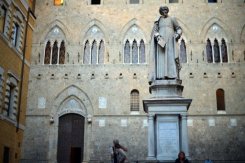
Created 18/10/2012
Moody's credit rating agency on Thursday downgraded the world's oldest bank, Italy's Banca Monte dei Paschi di Siena, to "junk" status on worries government recapitalisation plans will prove insufficient.
The lowering of BMPS's rating by two notches to "Baaa3", a non-investment grade, reflects Moody's view that "there remains a material probability that the bank will need to seek further external support," the agency said.
Critically exposed to the eurozone debt crisis, in June BMPS was forced to accept a government bailout, borrowing roughly 1.5 billion euros ($1.87 billion) in order to pay off debt and shore up its capital.
The bank has also said it would reduce its workforce by 4,600 people by 2015.
RT News
Switzerland arming in preparation for European meltdown?
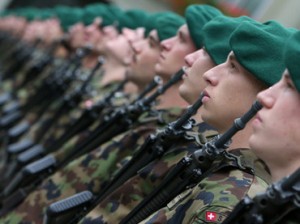
Published: 12 October, 2012
Members of Switzerland's Army Forces (Reuters / Thomas Hodel)
The Swiss Army is preparing contingency plans for violent unrest across Europe. A nation mostly famous for its banks, watches and chocolate fears it may face a massive influx of European refugees in the near future.
One of the world's richest nations openly expressed concerns over the possible outcome of Europe's continuing financial troubles, and is currently conducting army exercises against the possibility of riots along its borders.
In September, the Swiss military conducted exercises dubbed 'Stabilo Due,' with scenarios involving violent instability across the EU.
Switzerland has maintained an avowedly neutral stance for decades, and refused to join the eurozone when presented with the opportunity.
Bern's biggest fear is likely the disorganization of neighboring nations' armies that would follow general instability; the eurozone crisis and the severe austerity measures in the EU are forcing member-states to significantly slash their military budgets. If protest continues to spread across Europe, police and armed forces may find themselves ill-equipped to manage the unrest.
"I will not rule out that we will need the army in the coming years," Swiss Defense Minister Ueli Maurer said last Sunday.
The Swiss Defense Ministry has pressed ahead to modernize the country's army despite political opposition. With its multibillion-Franc military budget and an army of around 200,000 soldiers, the country also plans to purchase new 'Saab Gripen' jet fighters.
"Minister Maurer, accompanied by whispers from the top uniformed leadership in Switzerland, is trying to raise awareness that Europe's massive fiscal-cum-political crisis could get very unpleasant," John R. Schindler, a professor of national security affairs at the US Naval War College wrote in an article for the XX Committee website.
The Chief of the Swiss Armed Forces, Lieutenant General André Blattmann, likewise revealed plans to deploy an additional four battalions of military police (1,600 soldiers) to protect strategic points across the country. Blattmann is expected to present the plan in December.
Professor Schindler predicts that, "if the next Anders Brievik were to target Muslims, not fellow Europeans, things could get unimaginably ugly very quickly," which could trigger widespread Muslim uprisings in Europe.
Switzerland, however, stands in stark opposition to the multicultural policies and thinking now common in other European nations. In 2009, Switzerland passed a national referendum banning the construction of Islamic minarets .
And while the global economic crisis has forced several European nations to cut military expenditures, Switzerland has maintained relatively consistent levels of defense spending.
***
The Independent
How rent-a-mob jihadis are tormenting a benighted Christian minority in Bashar al-Assad's Syria
A Tory MP says the West has failed its Christian friends under a brutal regime
MARK FIELD
Sunday 14 October 2012
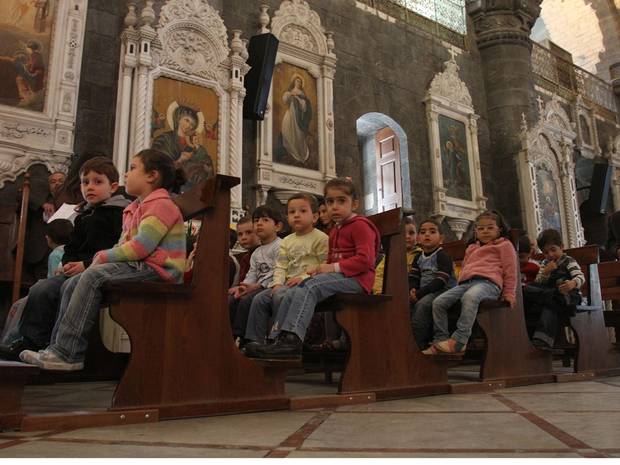
In January 1945, my mother, too young even for school, joined millions of other ethnic Germans fleeing westwards from Breslau as the Red Army advanced. My forefathers had lived in this region of Silesia (German since 1242) for at least nine generations that I know of. The forced repatriation - a process that might now be called ethnic cleansing - of my mother's family and millions of other civilians from groups whose nationality would in future be inextricably linked to their ethnicity, was largely overlooked in the euphoria that swept the world at the end of World War II.
They never returned.
Now we are witnessing another wave of civilian displacement in the Middle East with hundreds of thousands of Christians being forced to flee as they are banished from their 2,000 year old homelands in today's remarkable surge in Arabian people power.
Their fate has been largely forgotten as the global media attention has moved on from Egypt and Libya and encamped in Syria to watch the terrible bloodshed in Damascus, Houla, Aleppo and Homs. Innocent people on all sides are enduring awful hardship, death and torture; civil war does not discriminate between young and old, rich or poor. In the ghastly bloodletting we are now seeing, no one seems safe from the prospect of sudden death and destruction of property.
Desperation
Yet for the two million plus Syrian followers of Christ, whose lineage goes back 2000 years to St Paul's proselytising in the first century AD, these are especially desperate times. Ethnic cleansing is an ugly phrase, but that's just what is going on right now for Christians in Syria. The unspeakable truth now is that the sizeable Christian communities in war-torn Syria are at greater threat of ethnic cleansing from their ancestral homes than has been the case for generations - often at the hands of the self-styled freedom fighters so feted by the Western press.
These fighters, increasingly rent-a-mob Jihadists with no real stake in the affairs of Damascus, do not see the enclaves of Christians as genial neighbours who they have lived alongside for centuries, as many Syrian rebels do. It is true religious minorities often find their most assured protection under dictatorships. It pays not to rock the status quo.
But to use this as a reason to attack them, destroy ancient churches and hold them to ransom seems a convenient excuse. The Jihadists simply see them as representing an infidel faith and have turned their attentions on them in a way that was so much rarer for the Syrian-based rebels. Syria's Christians, who make up less than 10 per cent of the estimated 23 million population, include Greek Orthodox, Syriac Orthodox, Maronite and Melkite Greek Catholic faithful.
Already thousands have left, part of a larger tide of displaced Syrians escaping the conflict in which opposition groups say 27,000 people have died. In the Homs area 80,000 have fled as churches and community centres have been targeted, defaced, and their religious icons stolen. Whilst it is true that some Christians have held prominent positions under Assad they have also taken leading roles in the political opposition to Assad's rule, there are other Christians, like George Sabra, who ran for presidency of the opposition Syrian National Council, who have been staunchly anti-Assad.
The Iraqi example
These Christians are now abroad, staying with friends, in gardens or in churches in Lebanon, in Turkey, anywhere out of the firing line. Some have resorted to taking the Government's side and bearing arms, a move anathema to them throughout history. What my Syrian Christian constituents fear is that once gone, there will be no coming back. A rebel victory and a harder Islamist regime, may very well not want the return of a pluralist society, with Christians living alongside Shiite and Sunni Muslims as they have since biblical times.
Events in Iraq provide us with a timely example. Amidst savage bloodletting between Sunnis and Shiites in the aftermath of the US-led invasion of Iraq in 2003, the story of Iraq's Christian population is one that is rarely told. But since the invasion it is estimated that half their number has desperately been driven to exile outside the country.
Some 330,000 Iraqi Christians fled in the past decade to Syria alone - and are now fleeing again. Others have found safe haven in Jordan and naturally some have come to these shores, including to my constituency, the Cities of London and Westminster. Under Saddam Hussein, some Christians had risen to the top of politics, most notably Tariq Aziz, Hussein's Deputy Prime Minister. Yet since the dictator's fall, violence against the Christian minority, who were often associated with the "crusading invaders", has included kidnappings, the beheading of a priest, the bombing of ancient churches and forced conversion to Islam.
This is the backdrop to the fate that I fear will within a decade or so befall the long established Christian population in this region.
The West must act now to protect the Christians of Syria, Egypt and Iraq and make sure religious freedoms for Christians are enshrined in the laws of any future new regimes if we wish to avoid a similar scale of civilian displacement. And we must ensure that the banishment from their homelands of Middle Eastern Christians over the years ahead is not a dark derivative of the Middle Eastern uprising.
***
"There is no such thing, at this date of the world's history, in America, as an independent press. You know it and I know it. There is not one of you who dares to write your honest opinions, and if you did, you know beforehand that it would never appear in print. I am paid weekly for keeping my honest opinion out of the paper I am connected with. Others of you are paid similar salaries for similar things, and any of you who would be so foolish as to write honest opinions would be out on the streets looking for another job. If I allowed my honest opinions to appear in one issue of my paper, before twenty-four hours my occupation would be gone. The business of the journalists is to destroy the truth; to lie outright; to pervert; to vilify; to fawn at the feet of mammon, and to sell his country and his race for his daily bread. You know it and I know it and what folly is this toasting an independent press? We are the tools and vassals of rich men behind the scenes. We are the jumping jacks, they pull the strings and we dance. Our talents, our possibilities and our lives are all the property of other men. We are intellectual prostitutes." John Swinton, former Chief of Staff, The New York Times.
***
The Telegraph
96-year-old Indian 'is world's oldest father'
A man believed to be the world's oldest to father a child has sired another at the age of 96.
***

Until next week...keep on believing.
Almondtree Productions
“For
with God nothing shall be impossible.”
(Luke
1:37)